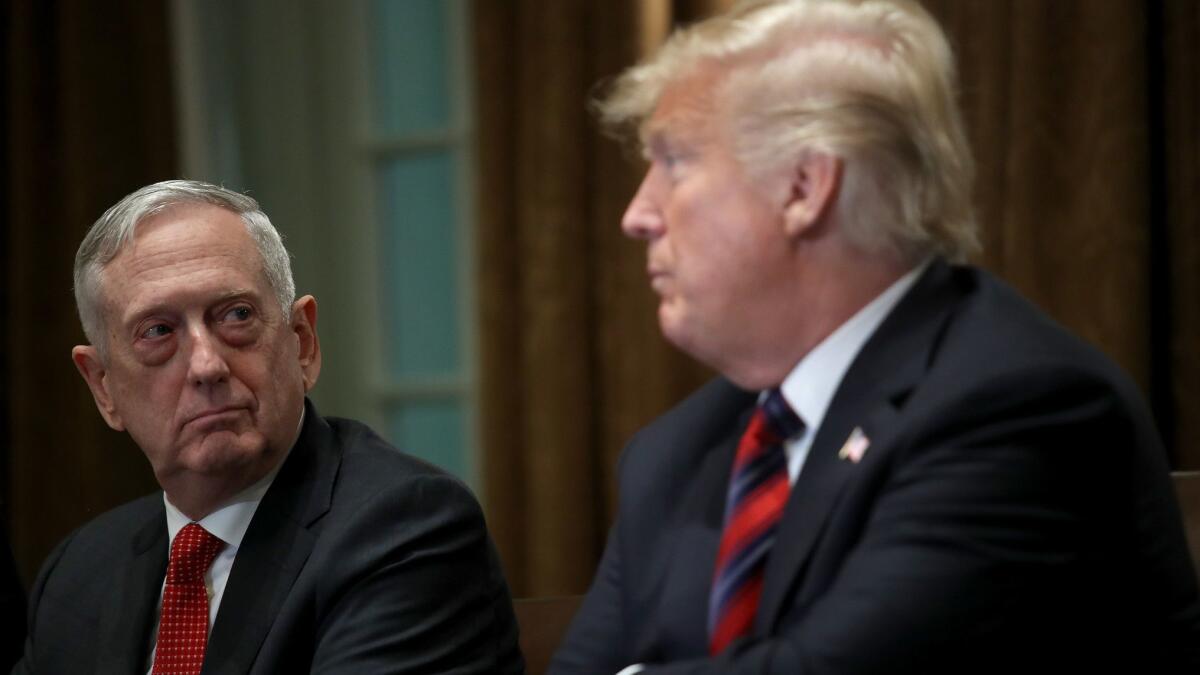Leadership vacuum in national defense positions is making Congress queasy

When he resigned as defense secretary last December, Jim Mattis thought it might take two months to install a successor. That seemed terribly long at the time.
Seven months later, the U.S. still has no confirmed defense chief even with the nation facing potential armed conflict with Iran. That’s the longest such stretch in Pentagon history.
There is also no confirmed deputy defense secretary, and other significant senior civilian and military Pentagon positions are in limbo, more than at any recent time.
The causes are varied, but this leadership vacuum has nonetheless begun to make members of Congress and others uneasy, creating a sense that something is amiss in a critical arm of the government at a time of global uncertainty.
William Cohen, a former Republican senator who served as defense secretary during President Clinton’s second term, says U.S. allies — “and even our foes” — expect more stability than this within the U.S. defense establishment.
“It is needlessly disruptive to have a leadership vacuum for so long at the Department of Defense as the department prepares for its third acting secretary in less than a year,” Cohen said. He said he worries about the cumulative effect of moving from one acting secretary to another while other key positions lack permanent appointees.
“There will inevitably be increasing uncertainty regarding which officials have which authority, which undermines the very principle of civilian control of the military,” Cohen said.
Key members of Congress are concerned too.
“We need Senate-confirmed leadership at the Pentagon, and quickly,” Sen. Jim Inhofe, an Oklahoma Republican who heads the Armed Services Committee, said. The panel’s ranking Democrat, Sen. Jack Reed of Rhode Island, said the vacancy problem has created “disarray” in the government’s largest bureaucracy.
It started with Mattis, who quit in December after a series of policy disputes with President Trump that culminated in his protest of administration plans to pull troops out of Syria as they battled remnants of Islamic State.
At least outwardly, the Pentagon has managed to stay on track during this churn, and senior officials caution against concluding that the military has been harmed.
Marine Gen. Joseph Dunford, whose chosen successor as chairman of the Joint Chiefs of Staff, Army Gen. Mark Milley, had his Senate confirmation hearing last week, told reporters that military commanders understand what their civilian leaders expect of them.
“We’ll look forward to a confirmed secretary of Defense in the near future, for sure, but I don’t think [the vacancies] had a significant impact over the last six months,” Dunford said. “I don’t believe that there’s been any ambiguity across the force about what they need to be doing and why they need to be doing it.”
The day after Dunford spoke, trouble struck on another personnel front, potentially endangering the nomination of Air Force Gen. John Hyten to take over as vice chairman of the Joint Chiefs of Staff when the incumbent, Gen. Paul Selva, retires July 31. The vice chairman is the nation’s second-highest military officer.
A senior military officer has accused Hyten of sexual misconduct. Members of Congress raised questions about the allegations and about the military investigation that found insufficient evidence to charge Hyten. It’s unclear when, or if, Hyten will get a confirmation hearing.
Last Sunday, the Navy was hit with its own leadership crisis.
Adm. William Moran, who had already been confirmed by the Senate to become the top Navy officer on Aug. 1, abruptly announced he was retiring . He said he felt compelled to quit because of an investigation into his use of personal email and questions about the wisdom of his association with a retired Navy officer who had been accused of inappropriate conduct with women in 2016.
Mark Esper, who has been the acting secretary of Defense since Mattis’ first fill-in, former Boeing executive Patrick Shanahan, abruptly resigned in June, is scheduled to testify at his confirmation hearing Tuesday. But even that comes with complications. He is required to step aside pending Senate confirmation, and Navy Secretary Richard Spencer will assume the role of acting defense secretary until Esper is approved. Spencer would then return to the Navy.
More to Read
Start your day right
Sign up for Essential California for news, features and recommendations from the L.A. Times and beyond in your inbox six days a week.
You may occasionally receive promotional content from the Los Angeles Times.






